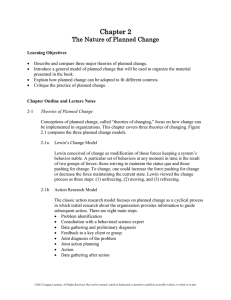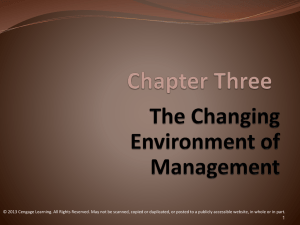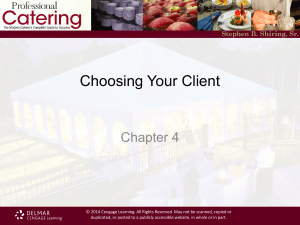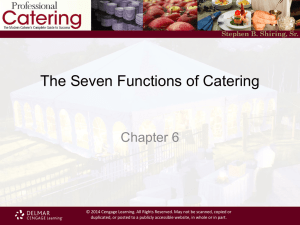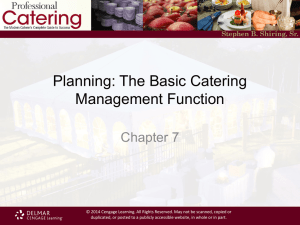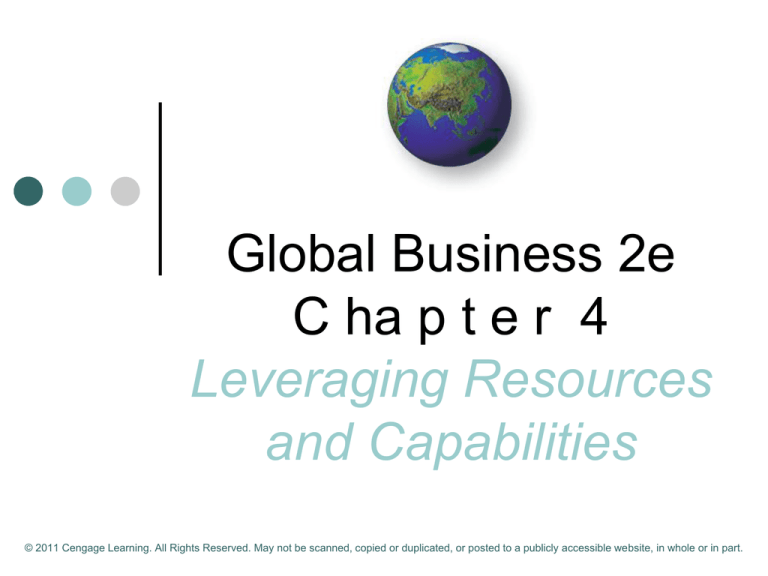
Global Business 2e
C ha p t e r 4
Leveraging Resources
and Capabilities
© 2011 Cengage Learning. All Rights Reserved. May not be scanned, copied or duplicated, or posted to a publicly accessible website, in whole or in part.
LEARNING OBJECTIVES
After studying this chapter, you should be able to:
1. Define resources and capabilities.
2. Explain how value is created from a firm’s resources
and capabilities.
3. Articulate the difference between keeping an activity in
house and outsourcing it.
4. Explain what a VRIO framework is.
5. Understand how to use a VRIO framework.
6. Participate in two leading debates on leveraging
resources and capabilities.
7. Draw implications for action.
© 2011 Cengage Learning. All Rights Reserved. May not be scanned, copied or duplicated, or posted to a publicly accessible website, in whole or in part.
UNDERSTANDING RESOURCES
AND CAPABILITIES
Resource-based view
Certain resources and capabilities specific to one
company are not shared by competitors.
SWOT analysis
A tool for determining a firm’s strengths (S),
weaknesses (W), opportunities (O), and threats (T).
© 2011 Cengage Learning. All Rights Reserved. May not be scanned, copied or duplicated, or posted to a publicly accessible website, in whole or in part.
UNDERSTANDING RESOURCES
AND CAPABILITIES
Resources (or capabilities)
The tangible and intangible assets a firm uses to
choose and implement its strategies.
Tangible resources and capabilities
Assets that are observable and easily quantified.
Intangible resources and capabilities
Assets that are hard to observe and difficult (if not
impossible) to quantify.
© 2011 Cengage Learning. All Rights Reserved. May not be scanned, copied or duplicated, or posted to a publicly accessible website, in whole or in part.
© 2011 Cengage Learning. All Rights Reserved. May not be scanned, copied or duplicated, or posted to a publicly accessible website, in whole or in part.
RESOURCES, CAPABILITIES,
AND THE VALUE CHAIN
Value chain
Series of activities used in the production
of goods and services that make a product
or service more valuable
? What do you think are the most important activities
in the value chain in the production and sale of a
common product, such as a cup or coffee?
© 2011 Cengage Learning. All Rights Reserved. May not be scanned, copied or duplicated, or posted to a publicly accessible website, in whole or in part.
RESOURCES, CAPABILITIES,
AND THE VALUE CHAIN
Benchmarking
Examining whether a firm has resources and
capabilities to perform a particular activity in a
manner superior to competitors
Commoditization
Process of market competition through which
unique products that command high prices and
high margins gradually lose their ability to do so,
thus becoming commodities
© 2011 Cengage Learning. All Rights Reserved. May not be scanned, copied or duplicated, or posted to a publicly accessible website, in whole or in part.
© 2011 Cengage Learning. All Rights Reserved. May not be scanned, copied or duplicated, or posted to a publicly accessible website, in whole or in part.
© 2011 Cengage Learning. All Rights Reserved. May not be scanned, copied or duplicated, or posted to a publicly accessible website, in whole or in part.
RESOURCES, CAPABILITIES,
AND THE VALUE CHAIN
Outsourcing
Turning over an organizational activity to an outside supplier
that will perform it on behalf of the focal firm.
Captive sourcing
Setting up subsidiaries abroad so that the work done is in-house
but the location is foreign. Also known as foreign direct
investment (FDI).
Offshoring
Oursourcing to an international or foreign firm.
Inshoring
Outsourcing to a domestic firm.
© 2011 Cengage Learning. All Rights Reserved. May not be scanned, copied or duplicated, or posted to a publicly accessible website, in whole or in part.
© 2011 Cengage Learning. All Rights Reserved. May not be scanned, copied or duplicated, or posted to a publicly accessible website, in whole or in part.
© 2011 Cengage Learning. All Rights Reserved. May not be scanned, copied or duplicated, or posted to a publicly accessible website, in whole or in part.
ANALYZING RESOURCES AND
CAPABILITIES WITH A VRIO
FRAMEWORK
Resource-based view focusing on the
value (V), rarity (R), imitability (I), and
organizational (O) aspects of resources
and capabilities
© 2011 Cengage Learning. All Rights Reserved. May not be scanned, copied or duplicated, or posted to a publicly accessible website, in whole or in part.
© 2011 Cengage Learning. All Rights Reserved. May not be scanned, copied or duplicated, or posted to a publicly accessible website, in whole or in part.
VALUE
Value-Adding resources lead to
competitive advantage
© 2011 Cengage Learning. All Rights Reserved. May not be scanned, copied or duplicated, or posted to a publicly accessible website, in whole or in part.
RARITY
Valuable and rare resources provide
competitive advantage
Valuable and common resources at
best lead to competitive parity
? When you think of a commonly known firm, what
are some of the rare resources it possesses?
© 2011 Cengage Learning. All Rights Reserved. May not be scanned, copied or duplicated, or posted to a publicly accessible website, in whole or in part.
IMITABILITY
Valuable and rare resources offer
competitive advantage when they are hard
for competitors to imitate
Causal ambiguity
Difficulty of identifying the actual cause of a
firm’s successful performance
© 2011 Cengage Learning. All Rights Reserved. May not be scanned, copied or duplicated, or posted to a publicly accessible website, in whole or in part.
ORGANIZATION
Firms must be properly organized to take full
advantage of the resources and capabilities
they possess
Complementary assets
Combination of numerous
resources and assets that enable
a firm to gain a competitive advantage
Social complexity
Socially intricate and interdependent
ways firms are typically organized
© 2011 Cengage Learning. All Rights Reserved. May not be scanned, copied or duplicated, or posted to a publicly accessible website, in whole or in part.
© 2011 Cengage Learning. All Rights Reserved. May not be scanned, copied or duplicated, or posted to a publicly accessible website, in whole or in part.
OFFSHORING OR NOT?
Original equipment manufacturer (OEM)
Firm that executes design blueprints provided by
Western firms
Original design manufacturer (ODM)
Firm that executes manufacturing based on their
own design blueprints
Original brand manufacturer (OBM)
Firm that executes manufacturing based on their
own design blueprints and sells the product
under their own brand name
© 2011 Cengage Learning. All Rights Reserved. May not be scanned, copied or duplicated, or posted to a publicly accessible website, in whole or in part.
© 2011 Cengage Learning. All Rights Reserved. May not be scanned, copied or duplicated, or posted to a publicly accessible website, in whole or in part.



